Charles E W Bean, Diaries, AWM38 3DRL 606/269/1 - 1918 - 1936 - Part 2
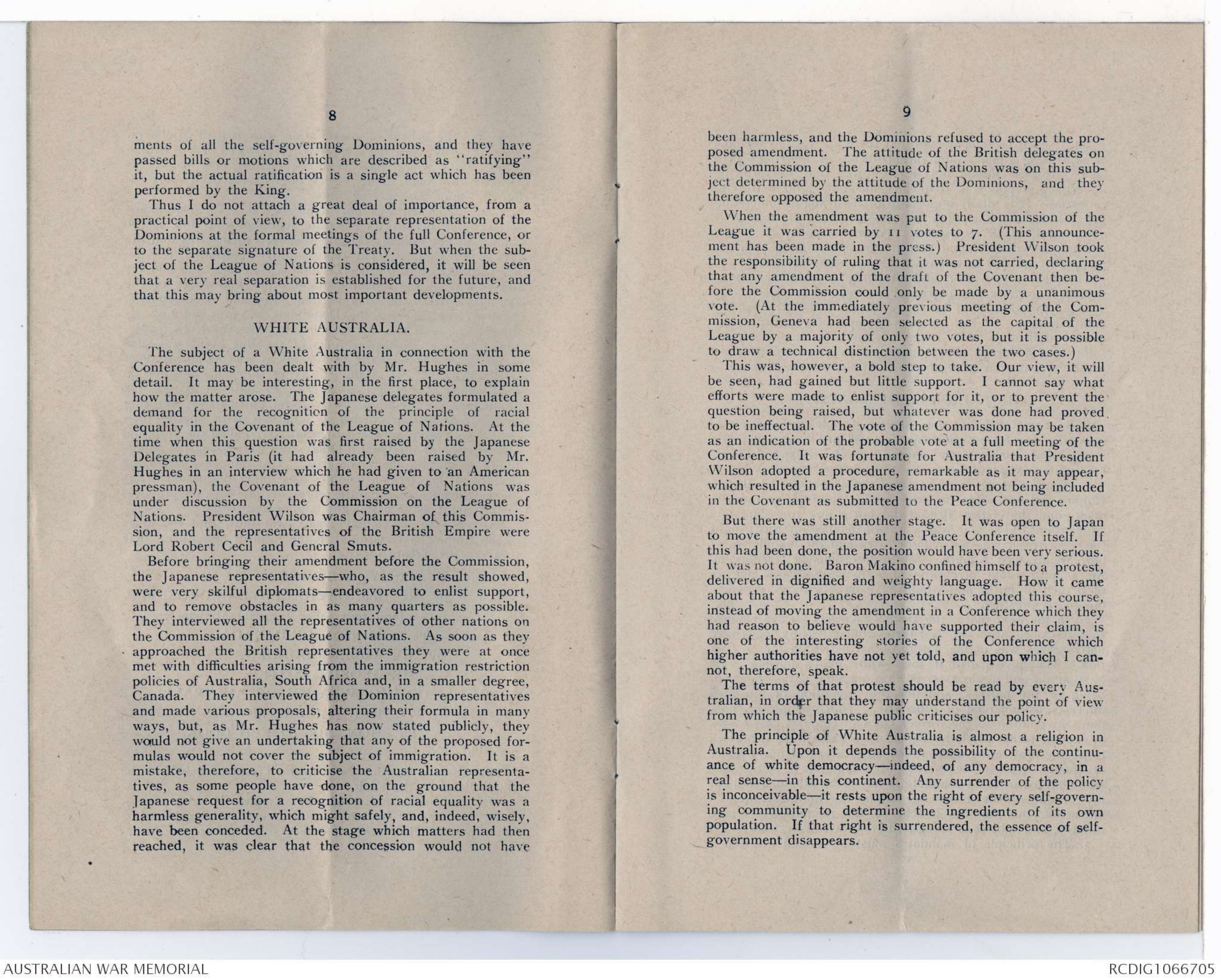
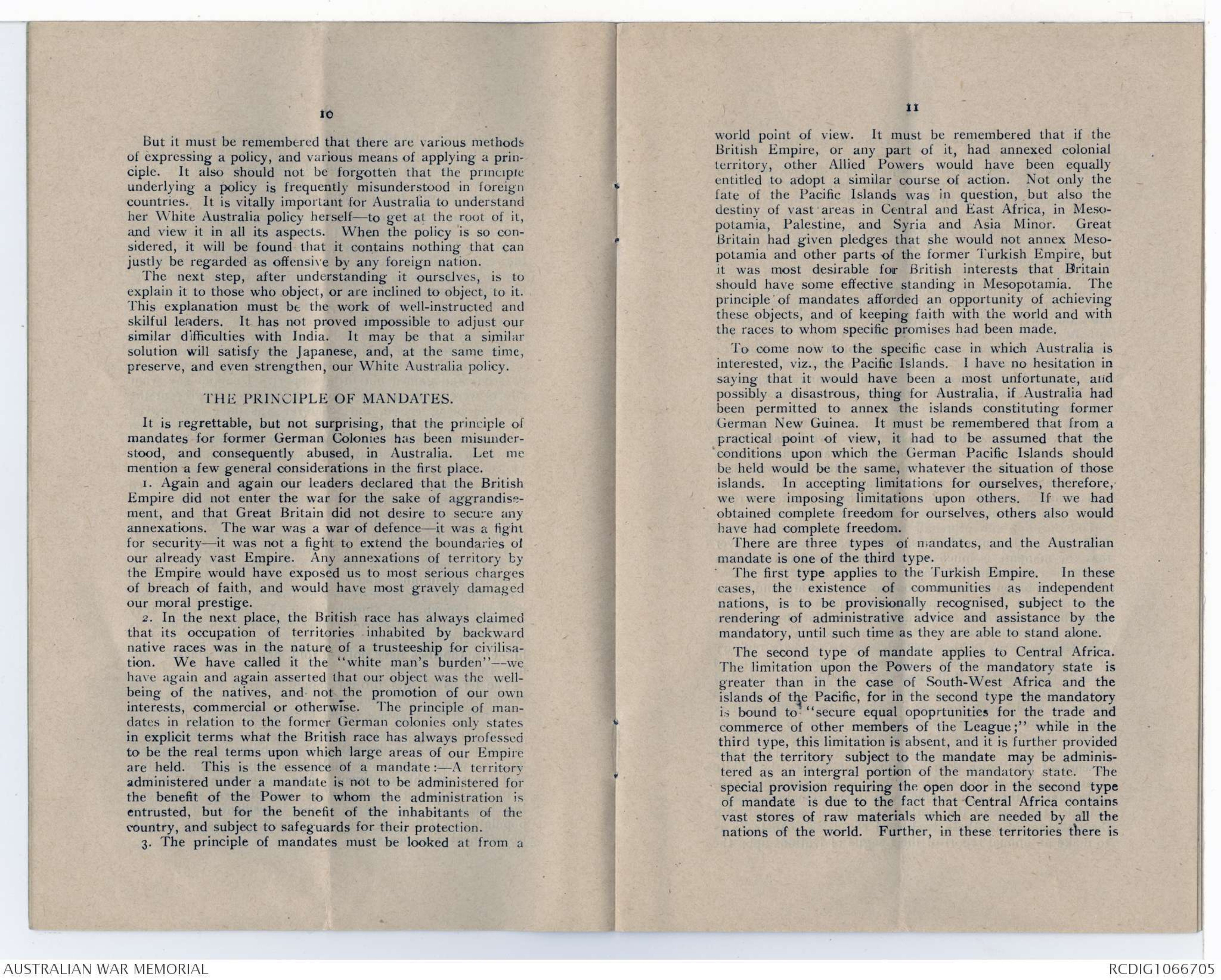
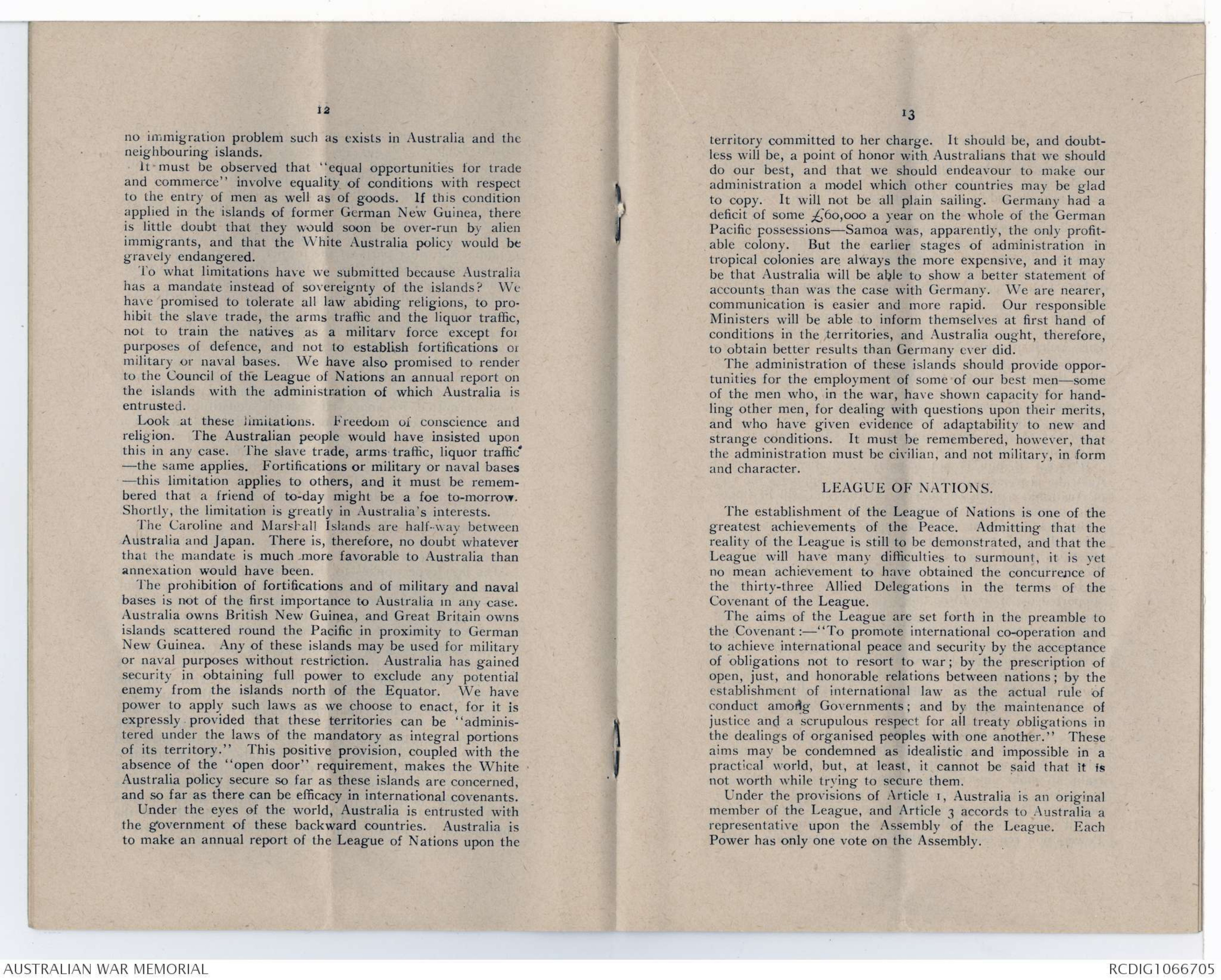
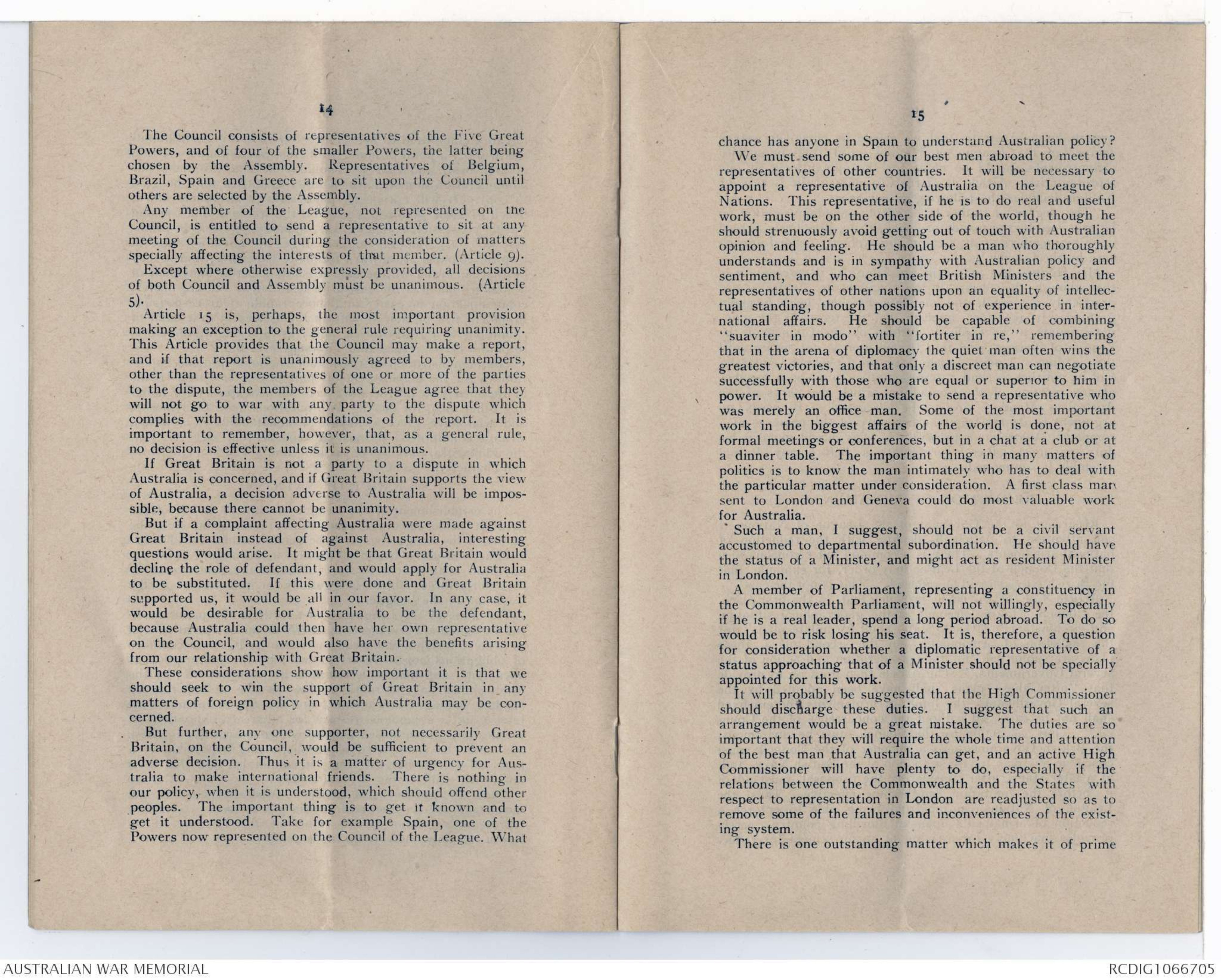
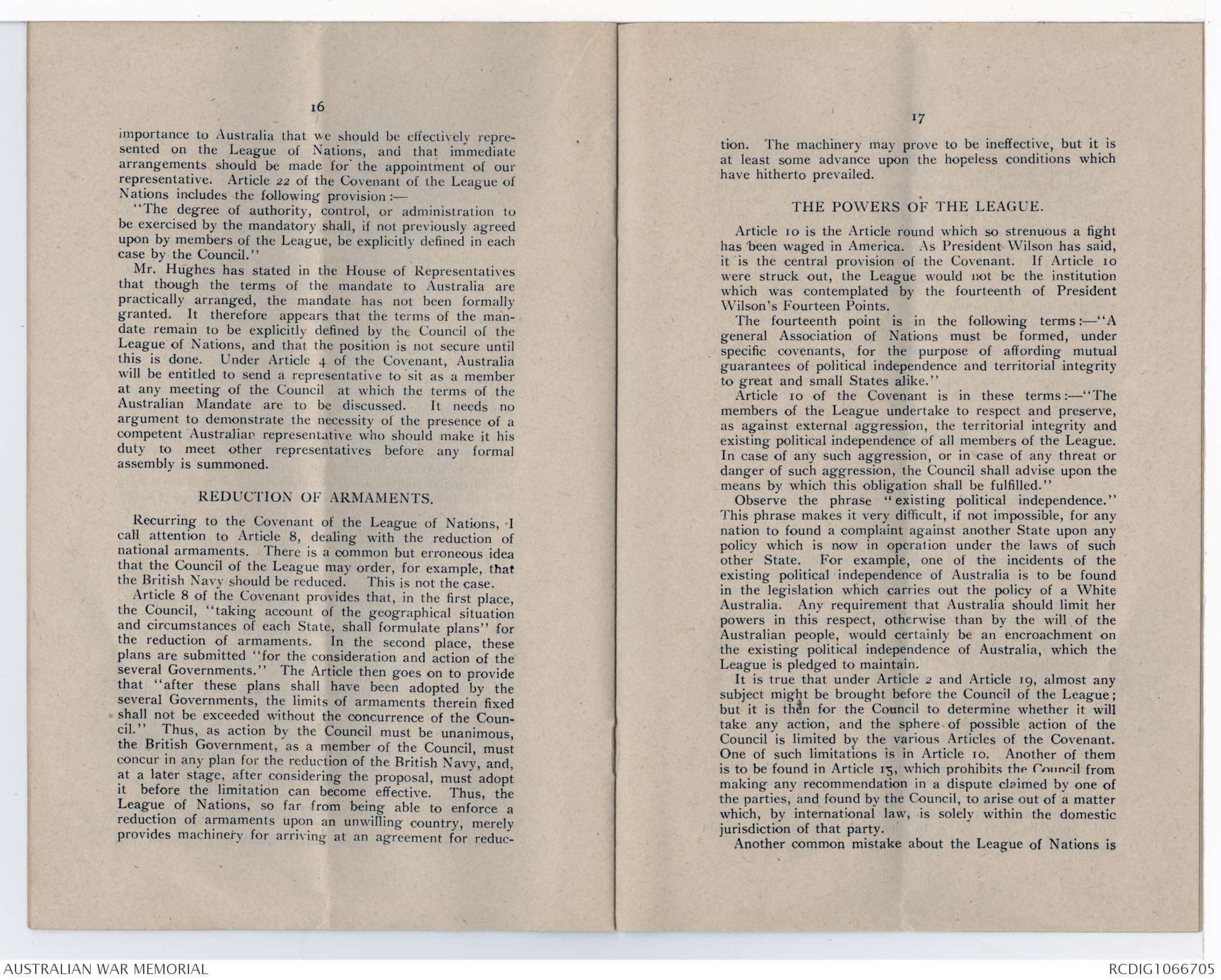
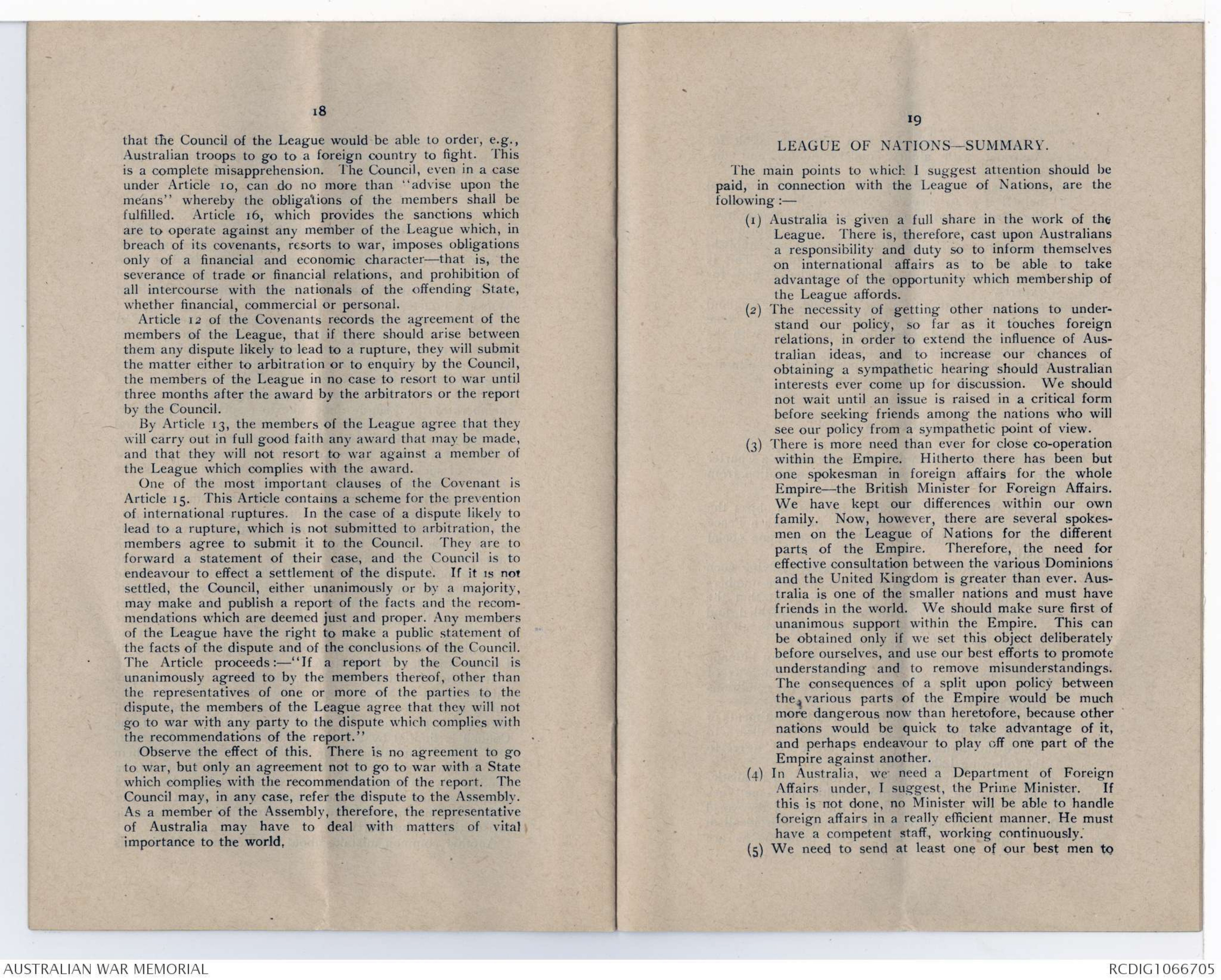
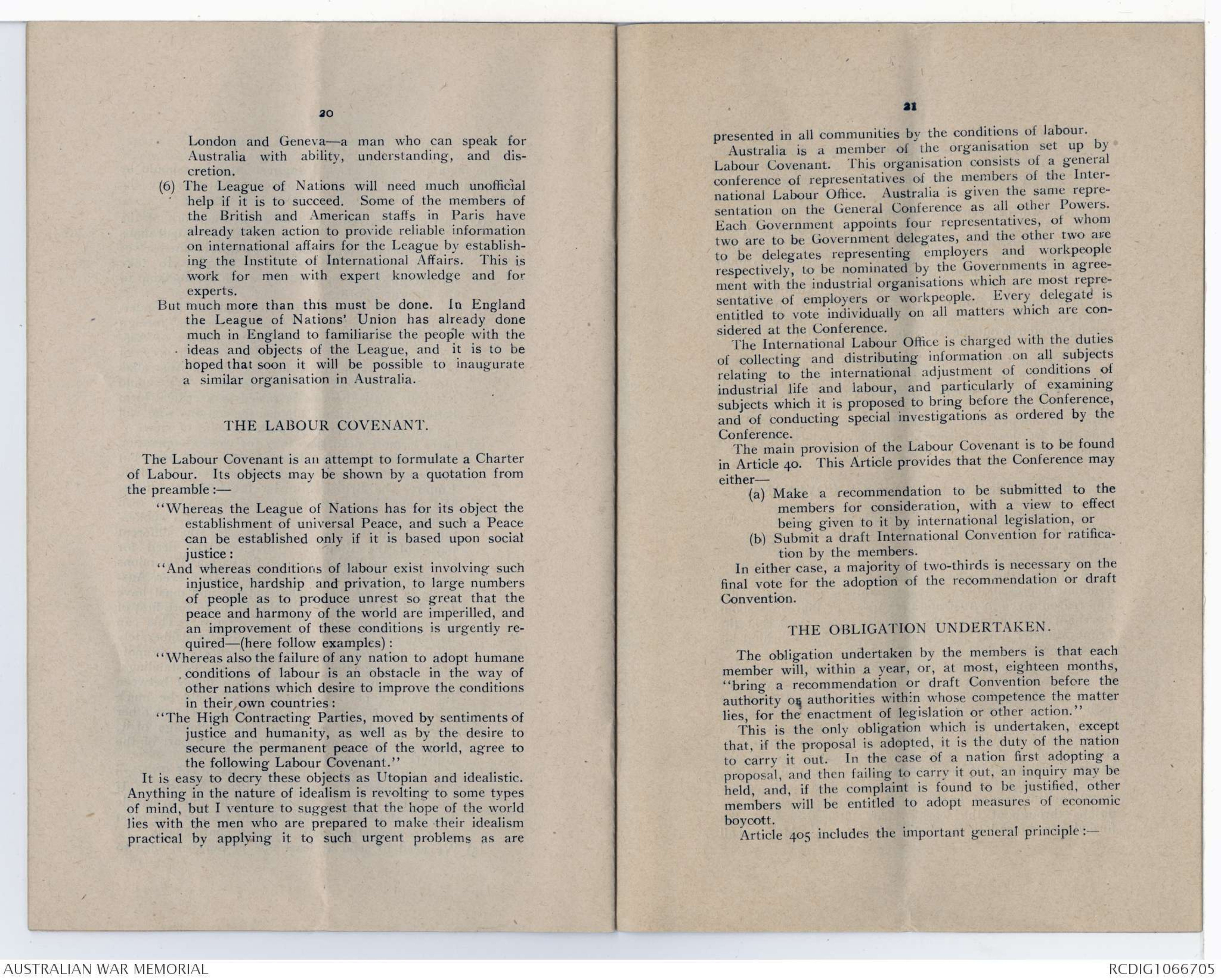
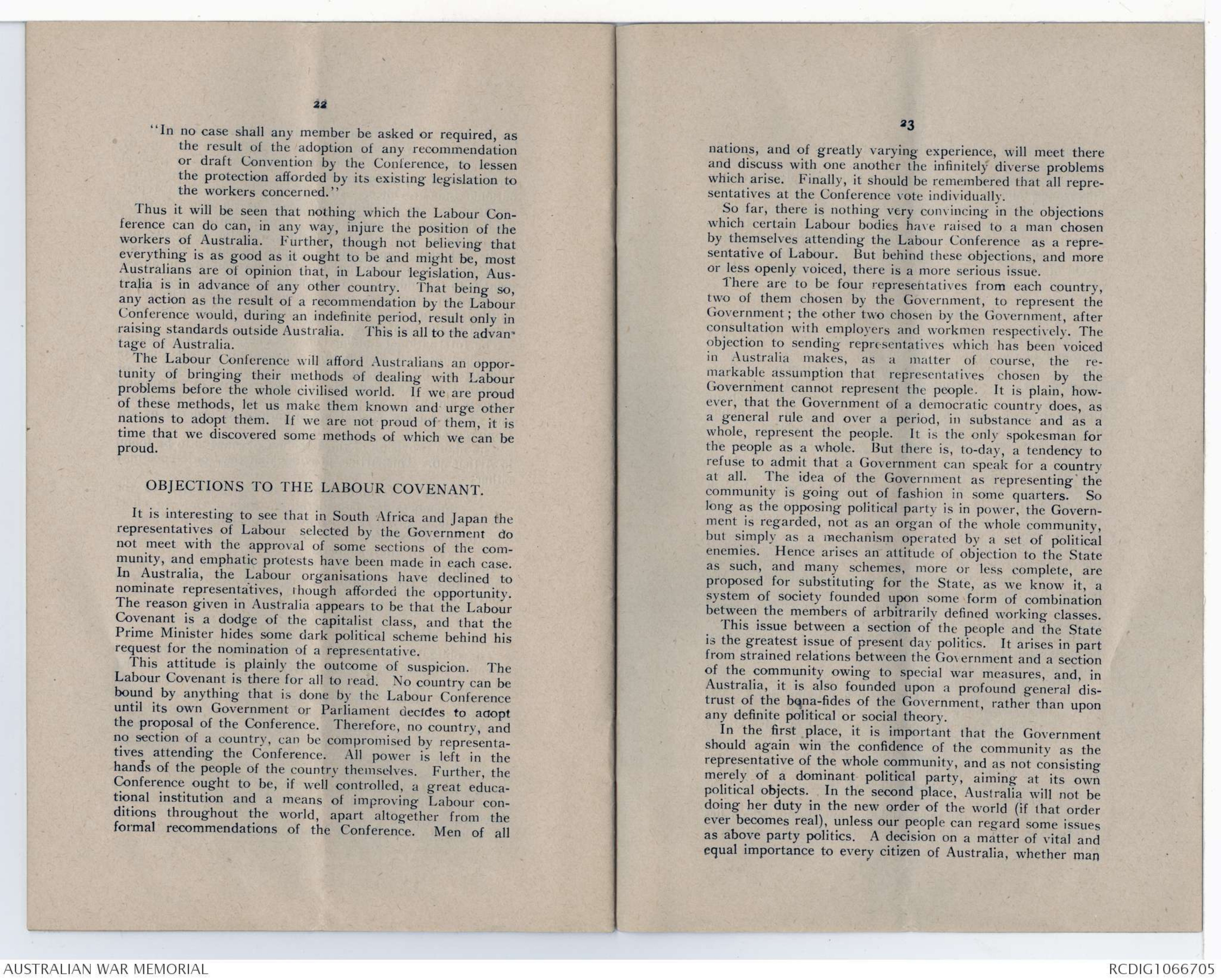
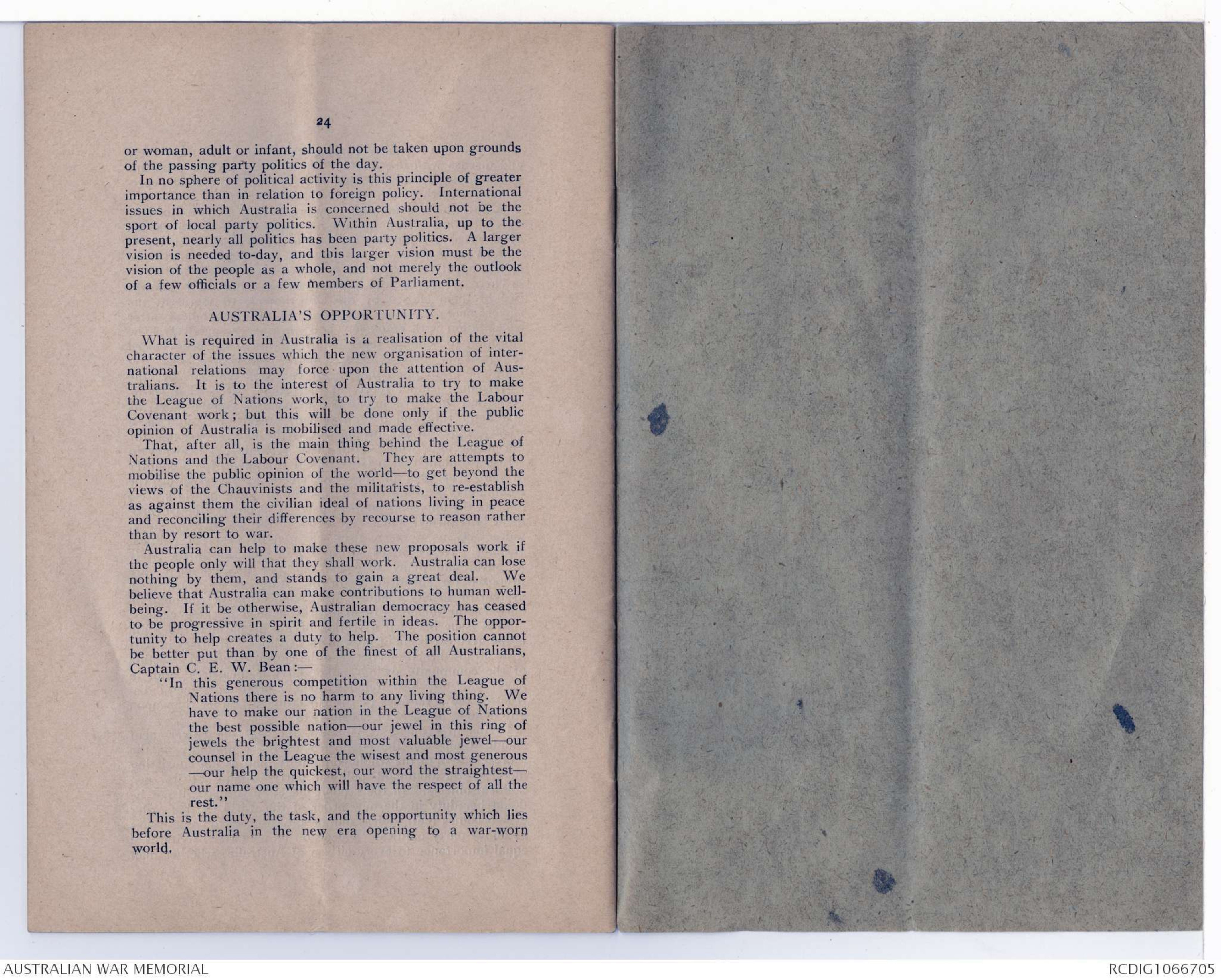
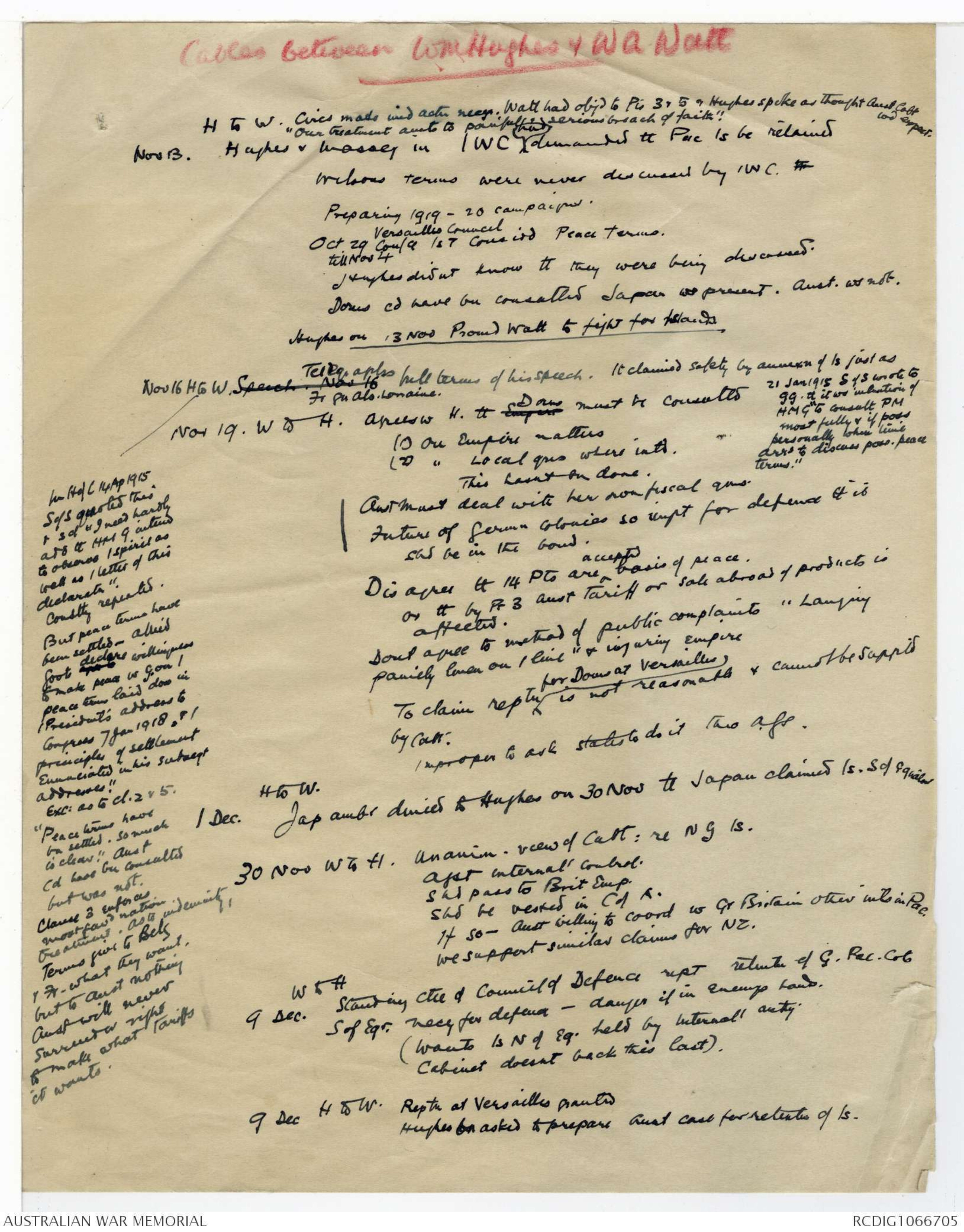
8
ments of all the self-governing Dominions, and they have
passed bills or motions which are described as ratifying
it, but the actual ratification is a single act which has been
performed by the King.
Thus I do not attach a great deal of importance, from a
practical point of view, to the separate representation of the
Dominions at the formal meetings of the full Conference, or
to the separate signature of the Treaty. But when the subject
of the League of Nations is considered, it will be seen
that a very real separation is established for the future, and
that this may bring about most important developments.
WHITE AUSTRALIA.
The subject of a White Australia in connection with the
Conference has been dealt with by Mr. Hughes in some
detail. It may be interesting, in the first place, to explain
how the matter arose. The Japanese delegates formulated a
demand for the recognition of the principle of racial
equality in the Covenant of the League of Nations. At the
time when this question was first raised by the Japanese
Delegates in Paris (it had already been raised by Mr.
Hughes in an interview which he had given to an American
pressman), the Covenant of the League of Nations was
under discussion by the Commission on the League of
Nations. President Wilson was Chairman of this Commission
and the representatives of the British Empire were
Lord Robert Cecil and General Smuts.
Before bringing their amendment before the Commission,
the Japanese representatives—who, as the result showed,
were very skilful diplomats—endeavored to enlist support,
and to remove obstacles in as many quarters as possible.
They interviewed all the representatives of other nations on
the Commission of the League of Nations. As soon as they
approached the British representatives they were at once
met with difficulties arising from the immigration restriction
policies of Australia, South Africa and, in a smaller degree,
Canada. They interviewed the Dominion representatives
and made various proposals, altering their formula in many
ways, but, as Mr. Hughes has now stated publicly, they
would not give an undertaking that any of the proposed
formulas would not cover the subject of immigration. It is a
mistake, therefore, to criticise the Australian representatives,
as some people have done, on the ground that the
Japanese request for a recognition of racial equality was a
harmless generality, which might safely, and, indeed, wisely,
have been conceded. At the stage which matters had then
reached, it was clear that the concession would not have
9
been harmless, and the Dominions refused to accept the
proposed amendment. The attitude of the British delegates on
the Commission of the League of Nations was on this subject
determined by the attitude of the Dominions, and they
therefore opposed the amendment.
When the amendment was put to the Commission of the
League it was carried by 11 votes to 7. (This announcement
has been made in the press.) President Wilson took
the responsibility of ruling that it was not carried, declaring
that any amendment of the draft of the Covenant then
before the Commission could only be made by a unanimous
vote. (At the immediately previous meeting of the Commission,
Geneva had been selected as the capital of the
League by a majority of only two votes, but it is possible
to draw a technical distinction between the two cases.)
This was, however, a bold step to take. Our view, it will
be seen, had gained but little support. I cannot say what
efforts were made to enlist support for it, or to prevent the
question being raised, but whatever was done had proved
to be ineffectual. The vote of the Commission may be taken
as an indication of the probable vote at a full meeting of the
Conference. It was fortunate for Australia that President
Wilson adopted a procedure, remarkable as it may appear
which resulted in the Japanese amendment not being included
in the Covenant as submitted to the Peace Conference.
But there was still another stage. It was open to Japan
to move the amendment at the Peace Conference itself. If
this had been done, the position would have been very serious.
It was not done. Baron Makino confined himself to a protest.
delivered in dignified and weighty language. How it came
about that the Japanese representatives adopted this course,
instead of moving the amendment in a Conference which they
had reason to believe would have supported their claim, is
one of the interesting stories of the Conference which
higher authorities have not yet told, and upon which I cannot,
therefore, speak.
The terms of that protest should be read by every Australian,
in order that they may understand the point of view
from which the Japanese public criticises our policy.
The principle of White Australia is almost a religion in
Australia. Upon it depends the possibility of the continuance
of white democracy—indeed, of any democracy, in a
real sense—in this continent. Any surrender of the policy
is inconceivable—it rests upon the right of every self-governing
community to determine the ingredients of its own
population. If that right is surrendered, the essence of
self-government disappears.
10
But it must be remembered that there are various methods
of expressing a policy, and various means of applying a
principle. It also should not be forgotten that the principle
underlying a policy is frequently misunderstood in foreign
countries. It is vitally important for Australia to understand
her White Australia policy herself—to get at the root of it,
and view it in all its aspects. When the policy is so considered,
it will be found that it contains nothing that can
justly be regarded as offensive by any foreign nation.
The next step, after understanding it ourselves, is to
explain it to those who object, or are inclined to object, to it.
This explanation must be the work of well-instructed and
skilful leaders. It has not proved impossible to adjust our
similar difficulties with India. It may be that a similar
solution will satisfy the Japanese, and, at the same time,
preserve, and even strengthen, our White Australia policy.
THE PRINCIPLE OF MANDATES.
It is regrettable, but not surprising, that the principle of
mandates for former German Colonies has been
misunderstood, and consequently abused, in Australia. Let me
mention a few general considerations in the first place.
1. Again and again our leaders declared that the British
Empire did not enter the war for the sake of aggrandisement,
and that Great Britain did not desire to secure any
annexations. The war was a war of defence - it was a fight
for security - it was not a fight to extend the boundaries of
our already vast Empire. Any annexations of territory by
the Empire would have exposed us to most serious charges
of breach of faith, and would have most gravely damaged
our moral prestige.
2. In the next place, the British race has always claimed
that its occupation of territories inhabited by backward
native races was in the nature of a trusteeship for civilisation.
We have called it the “white man’s burden- we
have again and again asserted that our object was the
well-being of the natives, and not the promotion of our own
interests, commercial or otherwise. The principle of mandates
in relation to the former German colonies only states
in explicit terms what the British race has always professed
to be the real terms upon which large areas of our Empire
are held. This is the essence of a mandate :- A territory
administered under a mandate is not to be administered for
the benefit of the Power to whom the administration is
entrusted, but for the benefit of the inhabitants of the
country, and subject to safeguards for their protection.
3. The principle of mandates must be looked at from a
11
world point of view. It must be remembered that if the
British Empire, or any part of it, had annexed colonial
territory, other Allied Powers would have been equally
entitled to adopt a similar course of action. Not only the
fate of the Pacific Islands was in question, but also the
destiny of vast areas in Central and East Africa, in
Mesopotamia, Palestine, and Syria and Asia Minor. Great
Britain had given pledges that she would not annex
Mesopotamia and other parts of the former Turkish Empire, but
it was most desirable for British interests that Britain
should have some effective standing in Mesopotamia. The
principle of mandates afforded an opportunity of achieving
these objects, and of keeping faith with the world and with
the races to whom specific promises had been made.
To come now to the specific case in which Australia is
interested, viz., the Pacific Islands. I have no hesitation in
saying that it would have been a most unfortunate, and
possibly a disastrous, thing for Australia, if Australia had
been permitted to annex the islands constituting former
German New Guinea. It must be remembered that from a
practical point of view, it had to be assumed that the
conditions upon which the German Pacific Islands should
be held would be the same, whatever the situation of those
islands. In accepting limitations for ourselves, therefore.
we were imposing limitations upon others. If we had
obtained complete freedom for ourselves, others also would
have had complete freedom.
There are three types of mandates, and the Australian
mandate is one of the third type.
The first type applies to the Turkish Empire. In these
cases, the existence of communities as independent
nations, is to be provisionally recognised, subject to the
rendering of administrative advice and assistance by the
mandatory, until such time as they are able to stand alone.
The second type of mandate applies to Central Africa.
The limitation upon the Powers of the mandatory state is
greater than in the case of South-West Africa and the
islands of the Pacific, for in the second type the mandatory
is bound to-“secure equal opoprtunities for the trade and
commerce of other members of the League;” while in the
third type, this limitation is absent, and it is further provided
that the territory subject to the mandate may be
administered as an intergral portion of the mandatory state. The
special provision requiring the open door in the second type
of mandate is due to the fact that Central Africa contains
vast stores of raw materials which are needed by all the
nations of the world. Further, in these territories there is
12
no immigration problem such as exists in Australia and the
neighbouring islands.
It must be observed that “equal opportunities for trade
and commerce” involve equality of conditions with respect
to the entry of men as well as of goods. If this condition
applied in the islands of former German New Guinea, there
is little doubt that they would soon be over-run by alien
immigrants, and that the White Australia policy would be
gravely endangered.
To what limitations have we submitted because Australia
has a mandate instead of sovereignty of the islands? We
have promised to tolerate all law abiding religions, to prohibit
the slave trade, the arms traffic and the liquor traffic,
not to train the natives as a military force except for
purposes of defence, and not to establish fortifications or
military or naval bases. We have also promised to render
to the Council of the League of Nations an annual report on
the islands with the administration of which Australia is
entrusted.
Look at these limitations. Freedom of conscience and
religion. The Australian people would have insisted upon
this in any case. The slave trade, arms traffic, liquor traffic
-the same applies. Fortifications or military or naval bases
-this limitation applies to others, and it must be
remembered that a friend of to-day might be a foe to-morrow
Shortly, the limitation is greatly in Australia’s interests.
The Caroline and Marshall Islands are half-way between
Australia and Japan. There is, therefore, no doubt whatever
that the mandate is much more favorable to Australia than
annexation would have been.
The prohibition of fortifications and of military and naval
bases is not of the first importance to Australia in any case.
Australia owns British New Guinea, and Great Britain owns
islands scattered round the Pacific in proximity to German
New Guinea. Any of these islands may be used for military
or naval purposes without restriction. Australia has gained
security in obtaining full power to exclude any potential
enemy from the islands north of the Equator. We have
power to apply such laws as we choose to enact, for it is
expressly provided that these territories can be “administered
under the laws of the mandatory as integral portions
of its territory.” This positive provision, coupled with the
absence of the “open door” requirement, makes the White
Australia policy secure so far as these islands are concerned,
and so far as there can be efficacy in international covenants.
Under the eyes of the world, Australia is entrusted with
the government of these backward countries. Australia is
to make an annual report of the League of Nations upon the
13
territory committed to her charge. It should be, and doubtless
will be, a point of honor with Australians that we should
do our best, and that we should endeavour to make our
administration a model which other countries may be glad
to copy. It will not be all plain sailing. Germany had a
deficit of some [Pound] 60,000 a year on the whole of the German
Pacific possessions—Samoa was, apparently, the only profitable
colony. But the earlier stages of administration in
tropical colonies are always the more expensive, and it may
be that Australia will be able to show a better statement of
accounts than was the case with Germany. We are nearer,
communication is easier and more rapid. Our responsible
Ministers will be able to inform themselves at first hand of
conditions in the territories, and Australia ought, therefore,
to obtain better results than Germany ever did.
The administration of these islands should provide opportunities
for the employment of some of our best men—some
of the men who, in the war, have shown capacity for handling
other men, for dealing with questions upon their merits,
and who have given evidence of adaptability to new and
strange conditions. It must be remembered, however, that
the administration must be civilian, and not military, in form
and character.
LEAGUE OF NATIONS.
The establishment of the League of Nations is one of the
greatest achievements of the Peace. Admitting that the
reality of the League is still to be demonstrated, and that the
League will have many difficulties to surmount, it is yet
no mean achievement to have obtained the concurrence of
the thirty-three Allied Delegations in the terms of the
Covenant of the League.
The aims of the League are set forth in the preamble to
the Covenant :—“To promote international co-operation and
to achieve international peace and security by the acceptance
of obligations not to resort to war; by the prescription of
open, just, and honorable relations between nations; by the
establishment of international law as the actual rule of
conduct among Governments; and by the maintenance of
justice and a scrupulous respect for all treaty obligations in
the dealings of organised peoples with one another.” These
aims may be condemned as idealistic and impossible in a
practical world, but, at least, it cannot be said that it is
not worth while trying to secure them.
Under the provisions of Article 1, Australia is an original
member of the League, and Article 3 accords to Australia a
representative upon the Assembly of the League. Each
Power has only one vote on the Assembly.
14
The Council consists of representatives of the Five Great
Powers, and of four of the smaller Powers, the latter being
chosen by the Assembly. Representatives of Belgium,
Brazil, Spain and Greece are to sit upon the Council until
others are selected by the Assembly.
Any member of the League, not represented on the
Council, is entitled to send a representative to sit at any
meeting of the Council during the consideration of matters
specially affecting the interests of that member. (Article 9).
Except where otherwise expressly provided, all decisions
of both Council and Assembly must be unanimous. (Article
Article 5).
Article 15 is, perhaps, the most important provision
making an exception to the general rule requiring unanimity.
This Article provides that the Council may make a report,
and if that report is unanimously agreed to by members,
other than the representatives of one or more of the parties
to the dispute, the members of the League agree that they
will not go to war with any party to the dispute which
complies with the recommendations of the report. It is
important to remember, however, that, as a general rule,
no decision is effective unless it is unanimous.
If Great Britain is not a party to a dispute in which
Australia is concerned, and if Great Britain supports the view
of Australia, a decision adverse to Australia will be impossible,
because there cannot be unanimity.
But if a complaint affecting Australia were made against
Great Britain instead of against Australia, interesting
questions would arise. It might be that Great Britain would
decline the role of defendant, and would apply for Australia
to be substituted. If this were done and Great Britain
supported us, it would be all in our favor. In any case, it
would be desirable for Australia to be the defendant,
because Australia could then have her own representative
on the Council, and would also have the benefits arising
from our relationship with Great Britain.
These considerations show how important it is that we
should seek to win the support of Great Britain in any
matters of foreign policy in which Australia may be
concerned.
But further, any one supporter, not necessarily Great
Britain, on the Council, would be sufficient to prevent an
adverse decision. Thus it is a matter of urgency for Australia
to make international friends. There is nothing in
our policy, when it is understood, which should offend other
peoples. The important thing is to get it known and to
get it understood. Take for example Spain, one of the
Powers now represented on the Council of the League. What
15
chance has anyone in Spain to understand Australian policy?
We must send some of our best men abroad to meet the
representatives of other countries. It will be necessary to
appoint a representative of Australia on the League of
Nations. This representative, if he is to do real and useful
work, must be on the other side of the world, though he
should strenuously avoid getting out of touch with Australian
opinion and feeling. He should be a man who thoroughly
understands and is in sympathy with Australian policy and
sentiment, and who can meet British Ministers and the
representatives of other nations upon an equality of intellectual
standing, though possibly not of experience in international
affairs. He should be capable of combining
“suaviter in modo” with “fortiter in re,” remembering
that in the arena of diplomacy the quiet man often wins the
greatest victories, and that only a discreet man can negotiate
successfully with those who are equal or superior to him in
power. It would be a mistake to send a representative who
was merely an office man. Some of the most important
work in the biggest affairs of the world is done, not at
formal meetings or conferences, but in a chat at a club or at
a dinner table. The important thing in many matters of
politics is to know the man intimately who has to deal with
the particular matter under consideration. A first class man
sent to London and Geneva could do most valuable work
for Australia.
Such a man, I suggest, should not be a civil servant
accustomed to departmental subordination. He should have
the status of a Minister, and might act as resident Minister
in London.
A member of Parliament, representing a constituency in
the Commonwealth Parliament, will not willingly, especially
if he is a real leader, spend a long period abroad. To do so
would be to risk losing his seat. It is, therefore, a question
for consideration whether a diplomatic representative of a
status approaching that of a Minister should not be specially
appointed for this work.
It will probably be suggested that the High Commissioner
should discharge these duties. I suggest that such an
arrangement would be a great mistake. The duties are so
important that they will require the whole time and attention
of the best man that Australia can get, and an active High
Commissioner will have plenty to do, especially if the
relations between the Commonwealth and the States with
respect to representation in London are readjusted so as to
remove some of the failures and inconveniences of the
existing system.
There is one outstanding matter which makes it of prime
16
importance to Australia that we should be effectively
represented on the League of Nations, and that immediate
arrangements should be made for the appointment of our
representative. Article 22 of the Covenant of the League of
Nations includes the following provision :
“The degree of authority, control, or administration to
be exercised by the mandatory shall, if not previously agreed
upon by members of the League, be explicitly defined in each
case by the Council."
Mr. Hughes has stated in the House of Representatives
that though the terms of the mandate to Australia are
practically arranged, the mandate has not been formally
granted. It therefore appears that the terms of the mandate
remain to be explicitly defined by the Council of the
League of Nations, and that the position is not secure until
this is done. Under Article 4 of the Covenant, Australia
will be entitled to send a representative to sit as a member
at any meeting of the Council at which the terms of the
Australian Mandate are to be discussed. It needs no
argument to demonstrate the necessity of the presence of a
competent Australian representative who should make it his
duty to meet other representatives before any formal
assembly is summoned.
REDUCTION OF ARMAMENTS.
Recurring to the Covenant of the League of Nations, l
call attention to Article 8, dealing with the reduction of
national armaments. There is a common but erroneous idea
that the Council of the League may order, for example, that
the British Navy should be reduced. This is not the case.
Article 8 of the Covenant provides that, in the first place,
the Council, “taking account of the geographical situation
and circumstances of each State, shall formulate plans” for
the reduction of armaments. In the second place, these
plans are submitted “for the consideration and action of the
several Governments.” The Article then goes on to provide
that “after these plans shall have been adopted by the
several Governments, the limits of armaments therein fixed
shall not be exceeded without the concurrence of the Council".
Thus, as action by the Council must be unanimous,
the British Government, as a member of the Council, must
concur in any plan for the reduction of the British Navy, and,
at a later stage, after considering the proposal, must adopt
it before the limitation can become effective. Thus, the
League of Nations, so far from being able to enforce a
reduction of armaments upon an unwilling country, merely
provides machinery for arriving at an agreement for reduction.
17
The machinery may prove to be ineffective, but it is
at least some advance upon the hopeless conditions which
have hitherto prevailed.
THE POWERS OF THE LEAGUE.
Article 10 is the Article round which so strenuous a fight
has been waged in America. As President Wilson has said,
it is the central provision of the Covenant. If Article 10
were struck out, the League would not be the institution
which was contemplated by the fourteenth of President
Wilson’s Fourteen Points.
The fourteenth point is in the following terms:—“A
general Association of Nations must be formed, under
specific covenants, for the purpose of affording mutual
guarantees of political independence and territorial integrity
to great and small States alike."
Article 10 of the Covenant is in these terms:—“The
members of the League undertake to respect and preserve,
as against external aggression, the territorial integrity and
existing political independence of all members of the League.
In case of any such aggression, or in case of any threat or
danger of such aggression, the Council shall advise upon the
means by which this obligation shall be fulfilled."
Observe the phrase “existing political independence."
This phrase makes it very difficult, if not impossible, for any
nation to found a complaint against another State upon any
policy which is now in operation under the laws of such
other State. For example, one of the incidents of the
existing political independence of Australia is to be found
in the legislation which carries out the policy of a White
Australia. Any requirement that Australia should limit her
powers in this respect, otherwise than by the will of the
Australian people, would certainly be an encroachment on
the existing political independence of Australia, which the
League is pledged to maintain.
It is true that under Article 2 and Article 19, almost any
subject might be brought before the Council of the League;
but it is then for the Council to determine whether it will
take any action, and the sphere of possible action of the
Council is limited by the various Articles of the Covenant.
One of such limitations is in Article 10. Another of them
is to be found in Article 15, which prohibits the Council from
making any recommendation in a dispute claimed by one of
the parties, and found by the Council, to arise out of a matter
which, by international law, is solely within the domestic
jurisdiction of that party.
Another common mistake about the League of Nations is
18
that the Council of the League would be able to order, e.g.,
Australian troops to go to a foreign country to fight. This
is a complete misapprehension. The Council, even in a case
under Article 10, can do no more than “advise upon the
means” whereby the obligations of the members shall be
fulfilled. Article 16, which provides the sanctions which
are to operate against any member of the League which, in
breach of its covenants, resorts to war, imposes obligations
only of a financial and economic character—that is, the
severance of trade or financial relations, and prohibition of
all intercourse with the nationals of the offending State,
whether financial, commercial or personal.
Article 12 of the Covenants records the agreement of the
members of the League, that if there should arise between
them any dispute likely to lead to a rupture, they will submit
the matter either to arbitration or to enquiry by the Council,
the members of the League in no case to resort to war until
three months after the award by the arbitrators or the report
by the Council.
By Article 13, the members of the League agree that they
will carry out in full good faith any award that may be made,
and that they will not resort to war against a member of
the League which complies with the award.
One of the most important clauses of the Covenant is
Article 15. This Article contains a scheme for the prevention
of international ruptures. In the case of a dispute likely to
lead to a rupture, which is not submitted to arbitration, the
members agree to submit it to the Council. They are to
forward a statement of their case, and the Council is to
endeavour to effect a settlement of the dispute. If it is not
settled, the Council, either unanimously or by a majority,
may make and publish a report of the facts and the
recommendations which are deemed just and proper. Any members
of the League have the right to make a public statement of
the facts of the dispute and of the conclusions of the Council.
The Article proceeds:—“If a report by the Council is
unanimously agreed to by the members thereof, other than
the representatives of one or more of the parties to the
dispute, the members of the League agree that they will not
go to war with any party to the dispute which complies with
the recommendations of the report.
Observe the effect of this. There is no agreement to go
to war, but only an agreement not to go to war with a State
which complies with the recommendation of the report. The
Council may, in any case, refer the dispute to the Assembly.
As a member of the Assembly, therefore, the representative
of Australia may have to deal with matters of vital
importance to the world,
19
LEAGUE OF NATIONS—SUMMARY.
The main points to which I suggest attention should be
paid, in connection with the League of Nations, are the
following :-
(1) Australia is given a full share in the work of the
League. There is, therefore, cast upon Australians
a responsibility and duty so to inform themselves
on international affairs as to be able to take
advantage of the opportunity which membership of
the League affords.
(2) The necessity of getting other nations to understand
our policy, so far as it touches foreign
relations, in order to extend the influence of
Australian ideas, and to increase our chances of
obtaining a sympathetic hearing should Australian
interests ever come up for discussion. We should
not wait until an issue is raised in a critical form
before seeking friends among the nations who will
see our policy from a sympathetic point of view.
(3) There is more need than ever for close co-operation
within the Empire. Hitherto there has been but
one spokesman in foreign affairs for the whole
Empire—the British Minister for Foreign Affairs.
We have kept our differences within our own
family. Now, however, there are several spokes-
men on the League of Nations for the different
parts of the Empire. Therefore, the need for
effective consultation between the various Dominions
and the United Kingdom is greater than ever.
Australia is one of the smaller nations and must have
friends in the world. We should make sure first of
unanimous support within the Empire. This can
be obtained only if we set this object deliberately
before ourselves, and use our best efforts to promote
understanding and to remove misunderstandings.
The consequences of a split upon policy between
the, various parts of the Empire would be much
more dangerous now than heretofore, because other
nations would be quick to take advantage of it,
and perhaps endeavour to play off one part of the
Empire against another.
(4) In Australia, we need a Department of Foreign
Affairs under, I suggest, the Prime Minister. If
this is not done, no Minister will be able to handle
foreign affairs in a really efficient manner. He must
have a competent staff, working continuously.
(5) We need to send at least one of our best men to
20
London and Geneva—a man who can speak for
Australia with ability, understanding, and discretion.
(6) The League of Nations will need much unofficial
help if it is to succeed. Some of the members of
the British and American staffs in Paris have
already taken action to provide reliable information
on international affairs for the League by establishing
the Institute of International Affairs. This is
work for men with expert knowledge and for
experts.
But much more than this must be done. In England
the League of Nations' Union has already done
much in England to familiarise the people with the
ideas and objects of the League, and it is to be
hoped that soon it will be possible to inaugurate
a similar organisation in Australia.
THE LABOUR COVENANT.
The Labour Covenant is an attempt to formulate a Charter
of Labour. Its objects may be shown by a quotation from
the preamble :-
“Whereas the League of Nations has for its object the
establishment of universal Peace, and such a Peace
can be established only if it is based upon social
justice :
“And whereas conditions of labour exist involving such
injustice, hardship and privation, to large numbers
of people as to produce unrest so great that the
peace and harmony of the world are imperilled, and
an improvement of these conditions is urgently required -
(here follow examples):
“Whereas also the failure of any nation to adopt humane
conditions of labour is an obstacle in the way of
other nations which desire to improve the conditions
in their, own countries :
“The High Contracting Parties, moved by sentiments of
justice and humanity, as well as by the desire to
secure the permanent peace of the world, agree to
the following Labour Covenant."
It is easy to decry these objects as Utopian and idealistic.
Anything in the nature of idealism is revolting to some types
of mind, but I venture to suggest that the hope of the world
lies with the men who are prepared to make their idealism
practical by applying it to such urgent problems as are
21
presented in all communities by the conditions of labour.
Australia is a member of the organisation set up by
Labour Covenant. This organisation consists of a general
conference of representatives of the members of the
International Labour Office. Australia is given the same
representation on the General Conference as all other Powers.
Each Government appoints four representatives, of whom
two are to be Government delegates, and the other two are
to be delegates representing employers and workpeople
respectively, to be nominated by the Governments in
agreement with the industrial organisations which are most
representative of employers or workpeople. Every delegate is
entitled to vote individually on all matters which are
considered at the Conference.
The International Labour Office is charged with the duties
of collecting and distributing information on all subjects
relating to the international adjustment of conditions of
industrial life and labour, and particularly of examining
subjects which it is proposed to bring before the Conference,
and of conducting special investigations as ordered by the
Conference.
The main provision of the Labour Covenant is to be found
in Article 40. This Article provides that the Conference may
either -
(a) Make a recommendation to be submitted to the
members for consideration, with a view to effect
being given to it by international legislation, or
(b) Submit a draft International Convention for
ratification by the members.
In either case, a majority of two-thirds is necessary on the
final vote for the adoption of the recommendation or draft
Convention.
THE OBLIGATION UNDERTAKEN.
The obligation undertaken by the members is that each
member will, within a year, or, at most, eighteen months,
"bring a recommendation or draft Convention before the
authority or authorities within whose competence the matter
lies, for the enactment of legislation or other action."
This is the only obligation which is undertaken, except
that, if the proposal is adopted, it is the duty of the nation
to carry it out. In the case of a nation first adopting a
proposal, and then failing to carry it out, an inquiry may be
held, and, if the complaint is found to be justified, other
members will be entitled to adopt measures of economic
boycott.
Article 405 includes the important general principle :-
22
"In no case shall any member be asked or required, as
the result of the adoption of any recommendation
or draft Convention by the Conference, to lessen
the protection afforded by its existing legislation to
the workers concerned."
Thus it will be seen that nothing which the Labour
Conference can do can, in any way, injure the position of the
workers of Australia. Further, though not believing that
everything is as good as it ought to be and might be, most
Australians are of opinion that, in Labour legislation,
Australia is in advance of any other country. That being so,
any action as the result of a recommendation by the Labour
Conference would, during an indefinite period, result only in
raising standards outside Australia. This is all to the advantage
of Australia.
The Labour Conference will afford Australians an opportunity
of bringing their methods of dealing with Labour
problems before the whole civilised world. If we are proud
of these methods, let us make them known and urge other
nations to adopt them. If we are not proud of them, it is
time that we discovered some methods of which we can be
proud.
OBJECTIONS TO THE LABOUR COVENANT.
It is interesting to see that in South Africa and Japan the
representatives of Labour selected by the Government do
not meet with the approval of some sections of the community,
and emphatic protests have been made in each case.
In Australia, the Labour organisations have declined to
nominate representatives, though afforded the opportunity.
The reason given in Australia appears to be that the Labour
Covenant is a dodge of the capitalist class, and that the
Prime Minister hides some dark political scheme behind his
request for the nomination of a representative.
This attitude is plainly the outcome of suspicion. The
Labour Covenant is there for all to read. No country can be
bound by anything that is done by the Labour Conference
until its own Government or Parliament decides to adopt
the proposal of the Conference. Therefore, no country, and
no section of a country, can be compromised by representatives
attending the Conference. All power is left in the
hands of the people of the country themselves. Further, the
Conference ought to be, if well controlled, a great educational
institution and a means of improving Labour conditions
throughout the world, apart altogether from the
formal recommendations of the Conference. Men of all
23
nations, and of greatly varying experience, will meet there
and discuss with one another the infinitely diverse problems
which arise. Finally, it should be remembered that all
representatives at the Conference vote individually.
So far, there is nothing very convincing in the objections
which certain Labour bodies have raised to a man chosen
by themselves attending the Labour Conference as a
representative of Labour. But behind these objections, and more
or less openly voiced, there is a more serious issue.
There are to be four representatives from each country,
two of them chosen by the Government, to represent the
Government ; the other two chosen by the Government, after
consultation with employers and workmen respectively. The
objection to sending representatives which has been voiced
in Australia makes, as a matter of course, the remarkable
assumption that representatives chosen by the
Government cannot represent the people. It is plain, however,
that the Government of a democratic country does, as
a general rule and over a period, in substance and as a
whole, represent the people. It is the only spokesman for
the people as a whole. But there is, to-day, a tendency to
refuse to admit that a Government can speak for a country
at all. The idea of the Government as representing the
community is going out of fashion in some quarters. So
long as the opposing political party is in power, the Government.
is regarded, not as an organ of the whole community,
but simply as a mechanism operated by a set of political
enemies. Hence arises an attitude of objection to the State
as such, and many schemes, more or less complete, are
proposed for substituting for the State, as we know it, a
system of society founded upon some form of combination
between the members of arbitrarily defined working classes.
This issue between a section of the people and the State
is the greatest issue of present day politics. It arises in part
from strained relations between the Government and a section
of the community owing to special war measures, and, in
Australia, it is also founded upon a profound general distrust
of the bona-fides of the Government, rather than upon
any definite political or social theory.
In the first place, it is important that the Government
should again win the confidence of the community as the
representative of the whole community, and as not consisting
merely of a dominant political party, aiming at its own
political objects. In the second place, Australia will not be
doing her duty in the new order of the world (if that order
ever becomes real), unless our people can regard some issues
as above party politics. A decision on a matter of vital and
equal importance to every citizen of Australia, whether man
24
or woman, adult or infant, should not be taken upon grounds
of the passing party politics of the day.
In no sphere of political activity is this principle of greater
importance than in relation to foreign policy. International
issues in which Australia is concerned should not be the
sport of local party politics. Within Australia, up to the
present, nearly all politics has been party politics. A larger
vision is needed to-day, and this larger vision must be the
vision of the people as a whole, and not merely the outlook
of a few officials or a few members of Parliament.
AUSTRALIA’S OPPORTUNITY.
What is required in Australia is a realisation of the vital
character of the issues which the new organisation of
international relations may force upon the attention of
Australians. It is to the interest of Australia to try to make
the League of Nations work, to try to make the Labour
Covenant work; but this will be done only if the public
opinion of Australia is mobilised and made effective.
That, after all, is the main thing behind the League of
Nations and the Labour Covenant. They are attempts to
mobilise the public opinion of the world—to get beyond the
views of the Chauvinists and the militarists, to re-establish
as against them the civilian ideal of nations living in peace
and reconciling their differences by recourse to reason rather
than by resort to war.
Australia can help to make these new proposals work if
the people only will that they shall work. Australia can lose
nothing by them, and stands to gain a great deal. We
believe that Australia can make contributions to human
well-being. If it be otherwise, Australian democracy has ceased
to be progressive in spirit and fertile in ideas. The opportunity
to help creates a duty to help. The position cannot
be better put than by one of the finest of all Australians,
Captain C. E. W. Bean:-
"In this generous competition within the League of
Nations there is no harm to any living thing. We
have to make our nation in the League of Nations
the best possible nation—our jewel in this ring of
jewels the brightest and most valuable jewel—our
counsel in the League the wisest and most generous
-our help the quickest, our word the straightest -
our name one which will have the respect of all the
rest.'
This is the duty, the task, and the opportunity which lies
before Australia in the new era opening to a war-worn
world.
Cables between WM Hughes & W A Watt
H to W.
Circs made imd actn negs. Watt had obgd to Ps 3 & 5 & Hughes spoke as thought Aust Cabt wd expect.
"Our treatment amts to painful & serious breach of faith".
Nov 13
Hughes & Massey in IWC ^had demanded tt PAC Is to be retained
Wilson's terms were never discussed by IWC. xx
Preparing 1919 - 20 campaign.
Versailles Council
Oct 29 Con 8 1st considd Peace terms.
till Nov 4
Hughes didnt know tt they were being discussed.
Doms cd have bn consulted Japan ws present. Aust ws not.
Hughes on 13 Nov Promd Watt to fight for Islands
Nov 16 H to W. Speech Nov 16 Telegraphs full terms of his speech.
Fr gnals Lorraine
[*It claimed safety by annexn of Is just as
21 Jan 1915 S of E wrote to
GG tt it ws intention of
HMG "to consult PM
most fully & if poss
personally when time
arrg to discuss poss. peace
terms"*]
[* pen Hq C 14Ap 1915
S of S quoted this
& sd "I need hardly
add tt HM G intend
to observe / spirit as
well as / letter of this
declaratn".
Constly repeated.
But peace terms have
been settled w allied
Govt xxx declare willingness
to make peace with G. on /
peace terms laid done in
President's address to
Congress 7 Jan 1918, & /
principles of settlement
enunciated in his subsqt
address."
Exc: as to cl.2 & 5.
"Peace terms have
bn settled. So much
is clear." Aust
cd have bn consulted
but was not.
Clause 3 enforces
most favd nation
treatment. As to indemnity
Terms give to Belg
& what they want,
but to Aust nothing
Aust will never
surrender right
to make what tariffs
it wants.*]
Nov 19 W to H agrees w H tt Empire Doms must be consulted
10 on Empire matters.
20 "Local qns where intd.
This hasnt bn done.
Aust must deal with her non fiscal qns.
Future of German colonies so input for defence tt is
shd be in the bond
Disagree tt 14 Pts are ^accepted basis of peace.
or tt by Pt 3 Aus Tariff or sale abroad of products is
affected.
Dont agree to method of public complaints "Laying
Hanging family linen on / line " & injuring empire
To claim reptn ^for Dons at Versailles is not reasonable & cannot be supported
by Cabt.
Improper to ask states to do it this 'A.gs.'
1 Dec H to W Jap ambr denied to Hughes on 30 Nov tt Japan claimed Is S of Equator
30 Nov W to H Unamin. view of Cabt: re N G Is.
Agst internal control.
Shd pass to Brit Emp.
Shd be vested in C of A.
If so - Aust willing to co-ord w Gr Britain other inls in Pac.
we support similar claims for N.Z.
9 Dec. W to H Standing Ctee of Council of Defence rept retentn of G. Pac. Cols
S of Eqr. Necy for defence - danger if in Enemys hands.
(wants Is N of Eq. held by internatl authy.
Cabinet doesnt back this last).
9 Dec H to W Reptn at Versailles granted
Hughes bn asked to prepare Aust case for retentn of Is.
 Sam scott
Sam scottThis transcription item is now locked to you for editing. To release the lock either Save your changes or Cancel.
This lock will be automatically released after 60 minutes of inactivity.